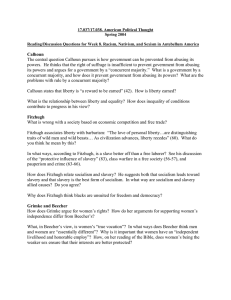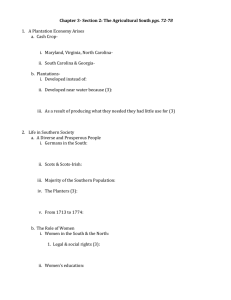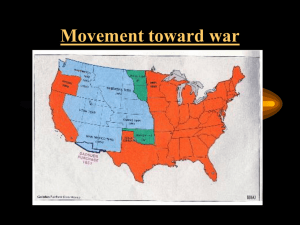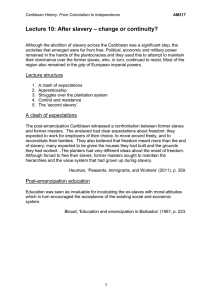17.037/17.038 American Political Thought Spring 2004 3/30/04 Student Lecture Notes
advertisement
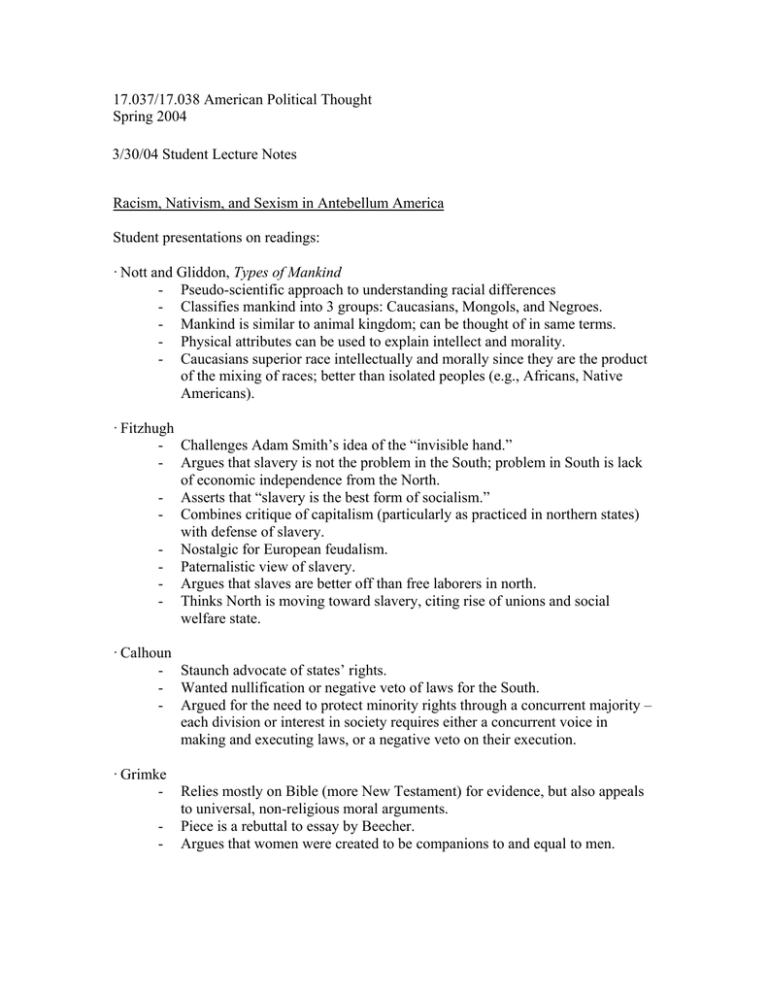
17.037/17.038 American Political Thought Spring 2004 3/30/04 Student Lecture Notes Racism, Nativism, and Sexism in Antebellum America Student presentations on readings: · Nott and Gliddon, Types of Mankind - Pseudo-scientific approach to understanding racial differences - Classifies mankind into 3 groups: Caucasians, Mongols, and Negroes. - Mankind is similar to animal kingdom; can be thought of in same terms. - Physical attributes can be used to explain intellect and morality. - Caucasians superior race intellectually and morally since they are the product of the mixing of races; better than isolated peoples (e.g., Africans, Native Americans). · Fitzhugh - Challenges Adam Smith’s idea of the “invisible hand.” - Argues that slavery is not the problem in the South; problem in South is lack of economic independence from the North. - Asserts that “slavery is the best form of socialism.” - Combines critique of capitalism (particularly as practiced in northern states) with defense of slavery. - Nostalgic for European feudalism. - Paternalistic view of slavery. - Argues that slaves are better off than free laborers in north. - Thinks North is moving toward slavery, citing rise of unions and social welfare state. · Calhoun - Staunch advocate of states’ rights. - Wanted nullification or negative veto of laws for the South. - Argued for the need to protect minority rights through a concurrent majority – each division or interest in society requires either a concurrent voice in making and executing laws, or a negative veto on their execution. · Grimke - Relies mostly on Bible (more New Testament) for evidence, but also appeals to universal, non-religious moral arguments. - Piece is a rebuttal to essay by Beecher. - Argues that women were created to be companions to and equal to men. · Beecher - Argues that women’s true vocation is to be wives, mothers, housewives, teachers, and nurses. - States that women are not properly educated for their true vocation, and that these professions are not honored as much as they should be. - Solution: organized education for women; distinct from education for men. - Argues that women should acknowledge inferiority and subservience to men (i.e., wife to husband), as argued in Bible (mostly Old Testament). Professor’s comments: - Fitzhugh argues that society functions best under slave system (which could include white slaves); although he also believed that American Black slaves were inferior, this was a secondary part of his argument. - Fitzhugh considered to be “soft racists,” while Nott and Gliddon typically considered “hard racists.” - Fitzhugh contends that “protected” slaves are better off than northern laborers, which are subject to class warfare and poverty generated by free society. - American school of ethnology: o Measured craniums in attempt to link physical attributes to mental ones. o Originally used to argue inferiority of Native Americans. o Extended by Nott to Black slaves as a means to justify slavery. o Nott struggled with characterizing races – despite obvious intermixing, still wants to have fixed categories of races; unable to successfully address this inherent contradiction. o Nott and Gliddon argue that, through intermingling of races, Caucasians have been strengthened; Caucasians have larger skulls and thus are superior. o Argument is pseudo-scientific as well as theological; accused of being heretics due to their challenging of Genesis and the idea of a single source of mankind. - Beecher: o Women have a “special status” in relation to men, and they should seek change through this status, not from outside of it (dissimilar to Grimke). o Beecher emphasizes differences between sexes, whereas Grimke emphasizes equality; these differences raised an interesting question for activists about which is the better political strategy from which to seek broader rights for women (e.g., suffrage) - Legal status of women: o Right to vote was focus of activism in nineteenth century. o Some activists (Stanton) fought for broader rights: property generally; property in marriage; divorce laws generally; more egalitarian divorce laws; reforming of Christianity to be friendlier to women. 2 o Several married women’s property acts passed after 1839; by 1850, 17 states had such laws; supported by Jacksonian states’ rights advocates. o Property law reforms: in part, response to changing economic conditions and to protect families from creditors, so not primarily motivated by gender egalitarian views o Gender and naturalization laws – for much of nineteenth century American women foreign men endangered their citizens status; in contrast, foreign wives of American male citizens determined to be U.S. citizens o Barber v. Barber (1858) – Supreme Court decided that women can have distinct state citizenship from their husbands. This permitted since no great political costs since citizenship for these foreign wives did not translate into specific political rights such as the franchise. 3
